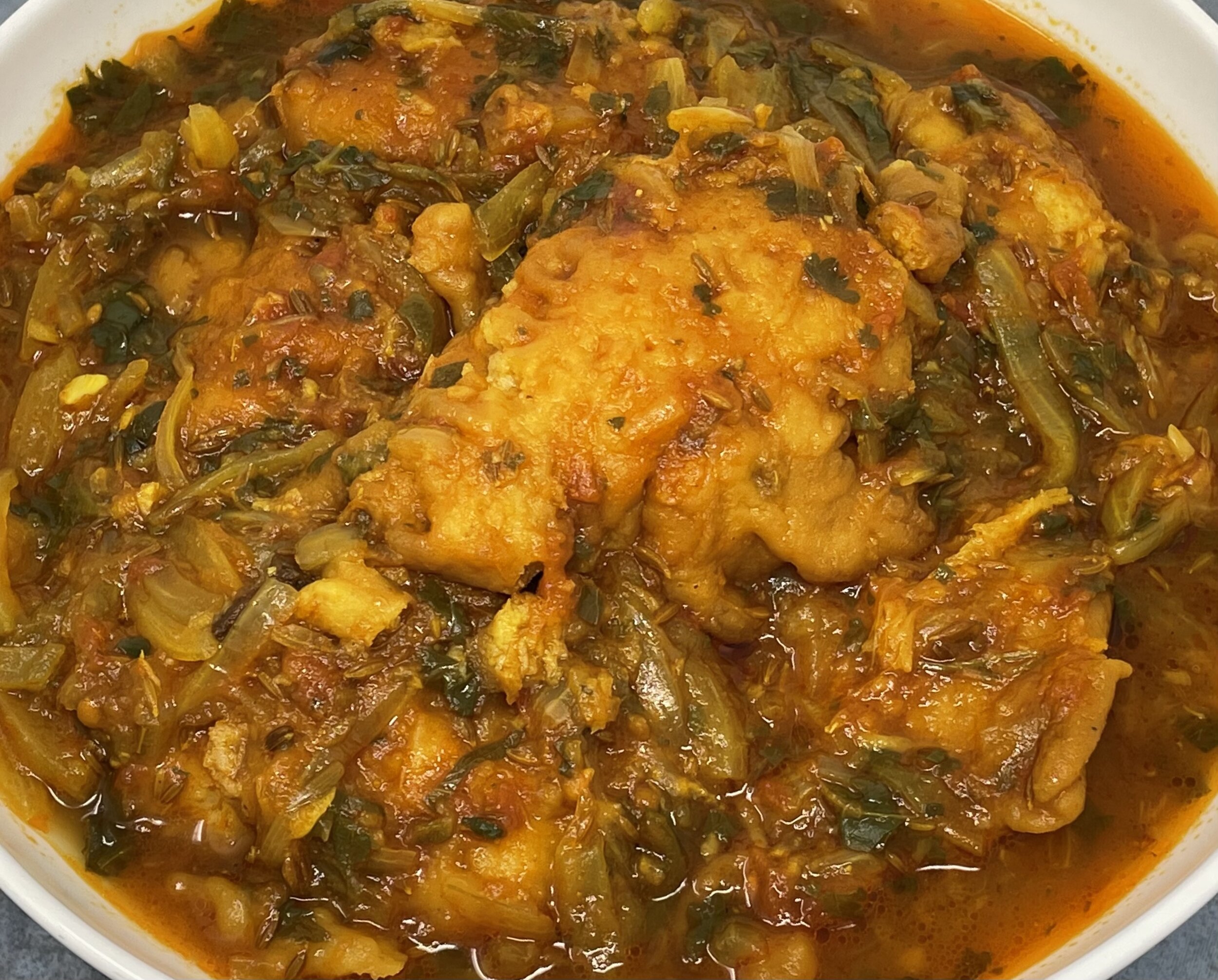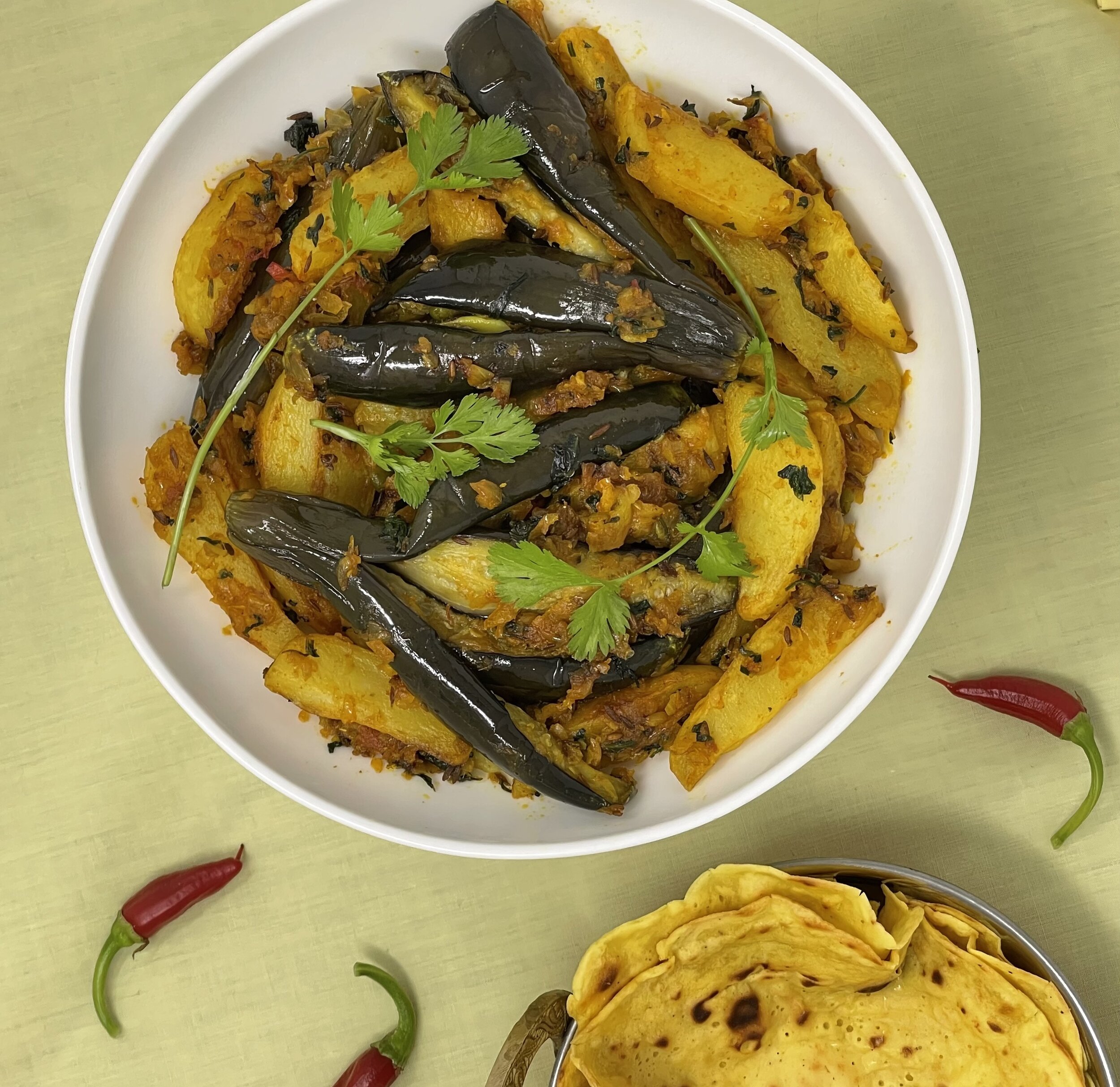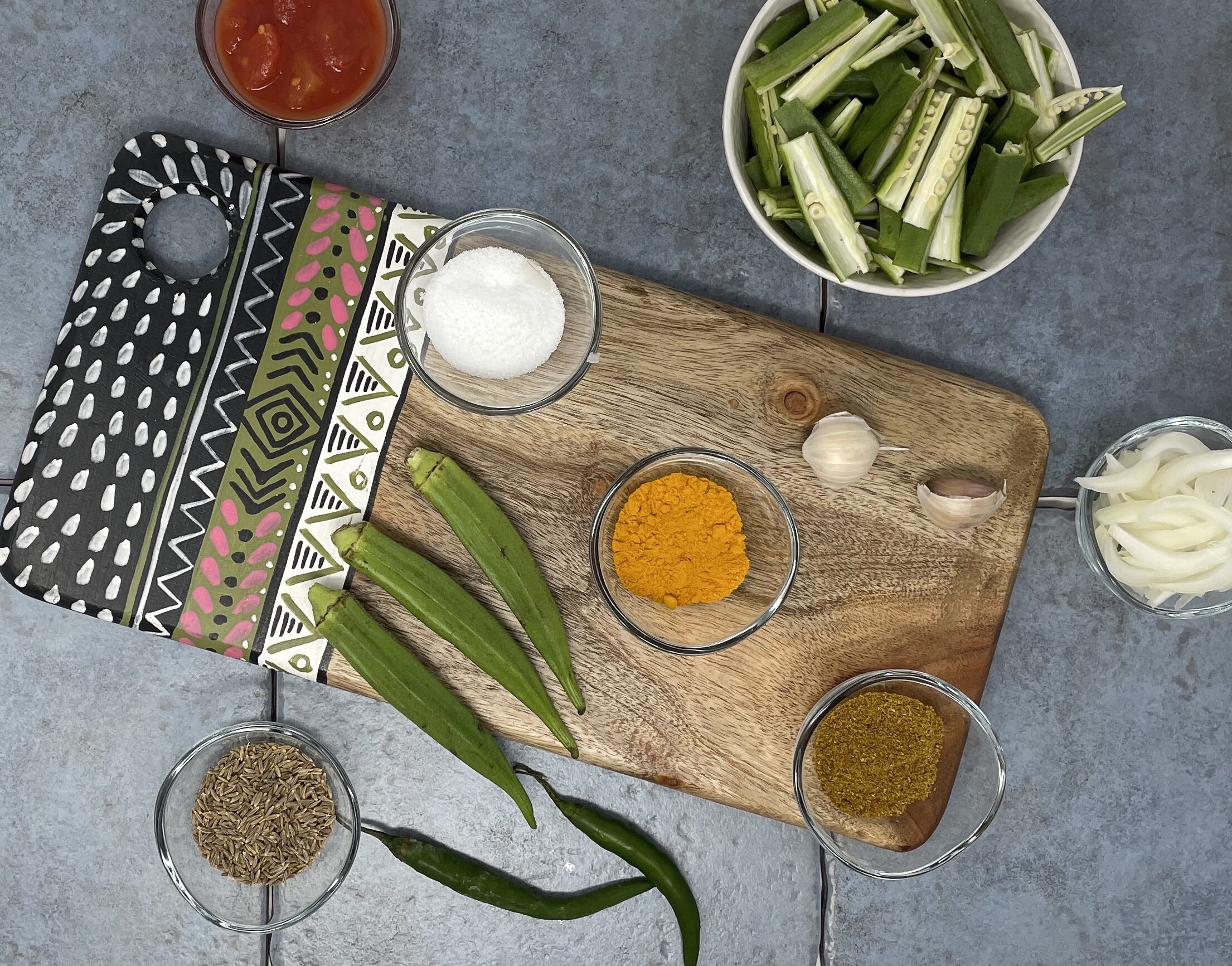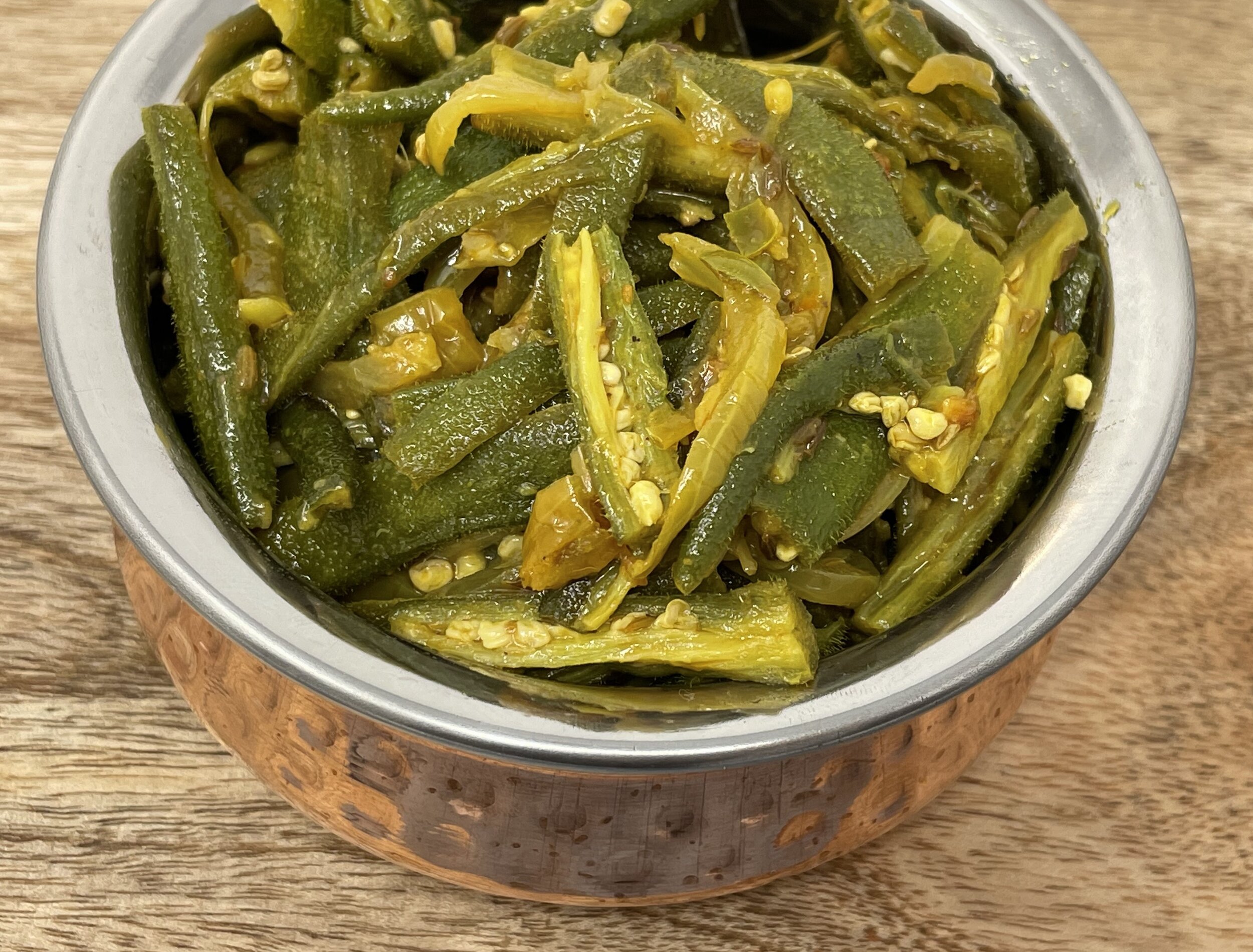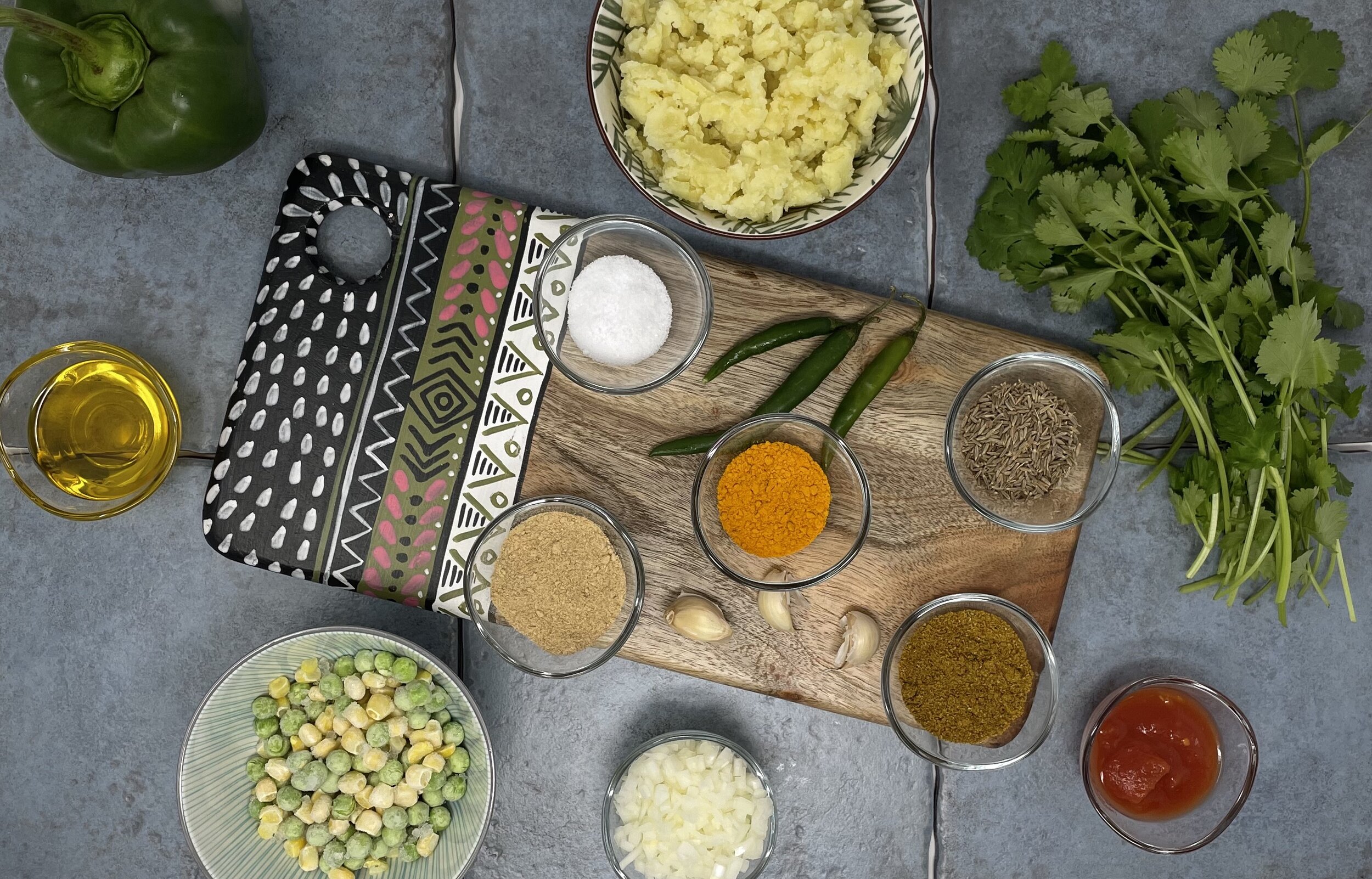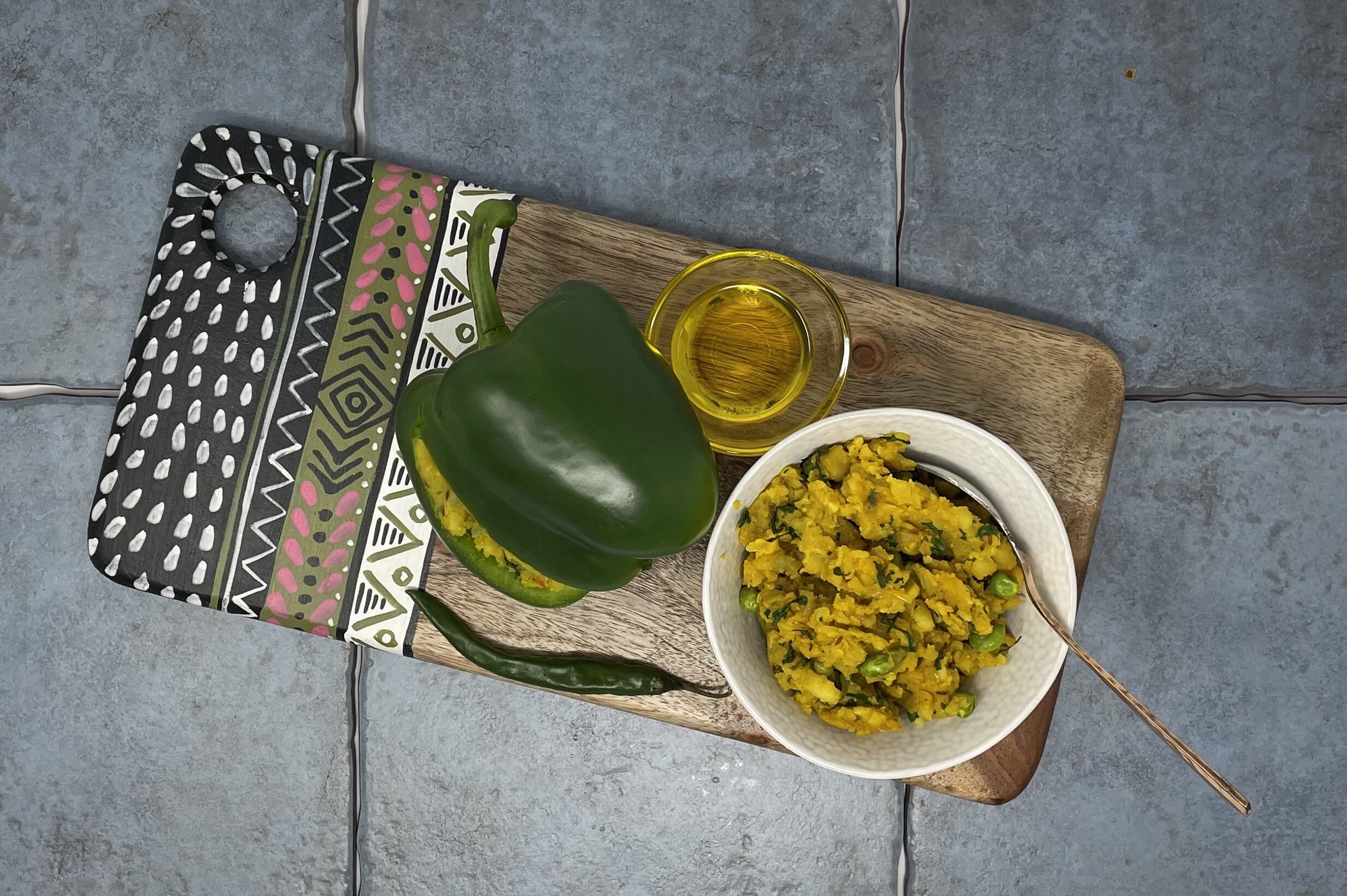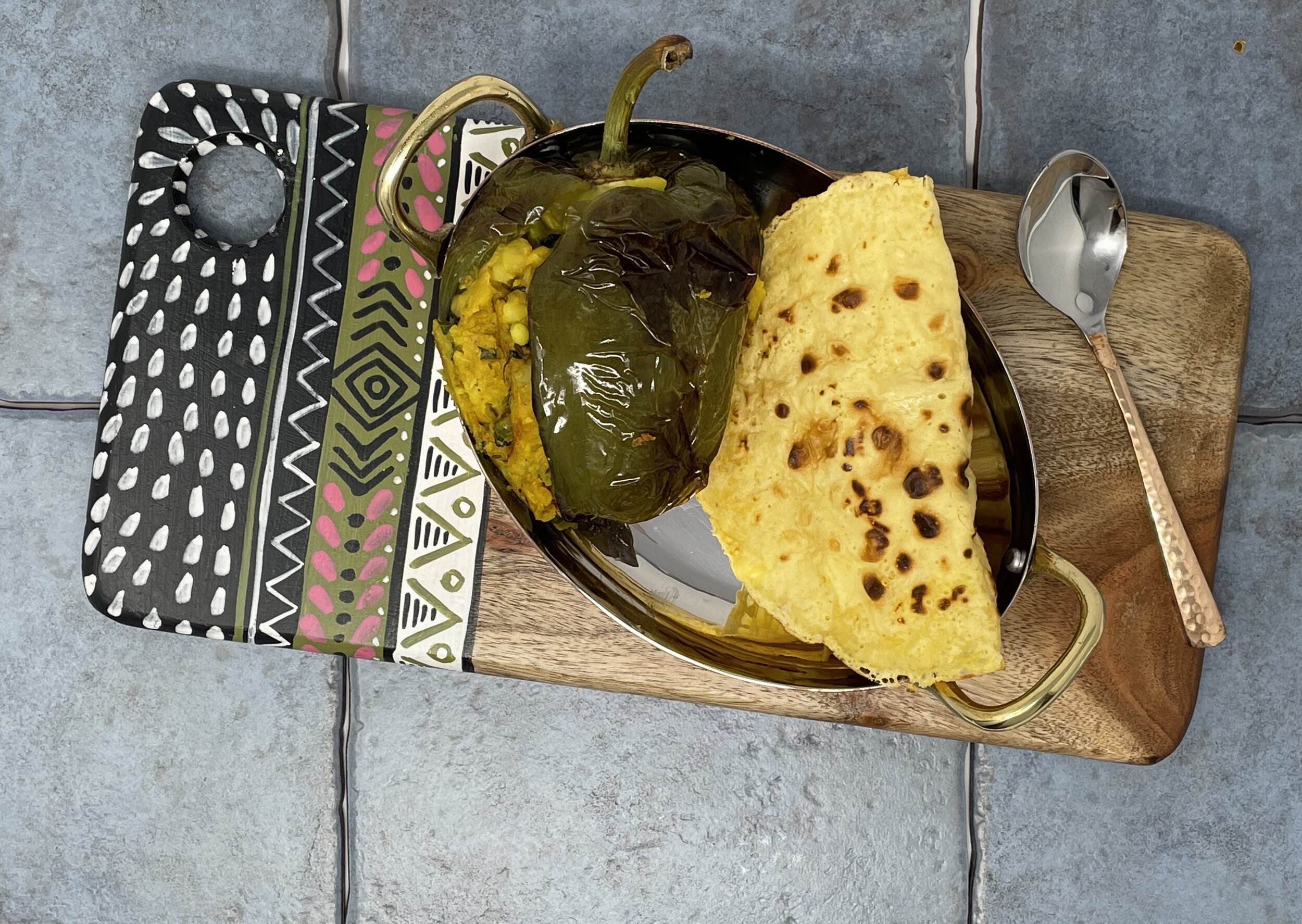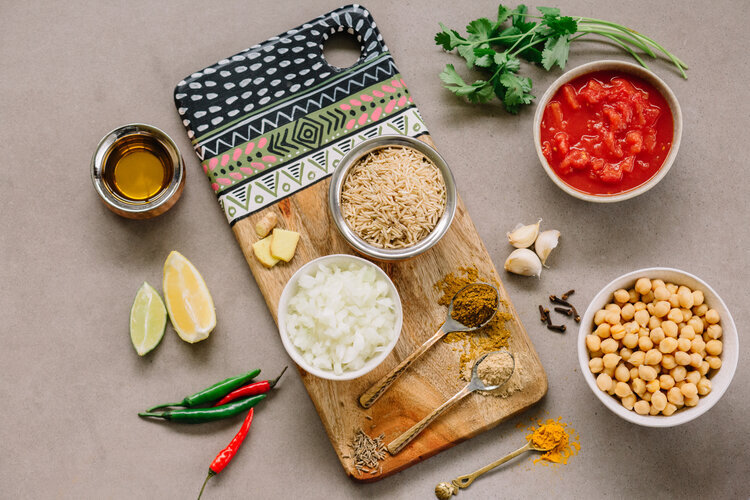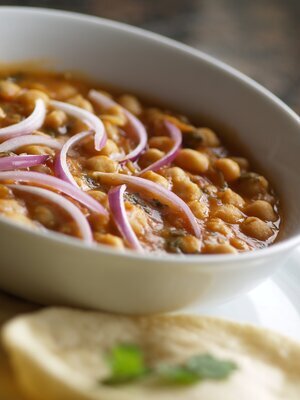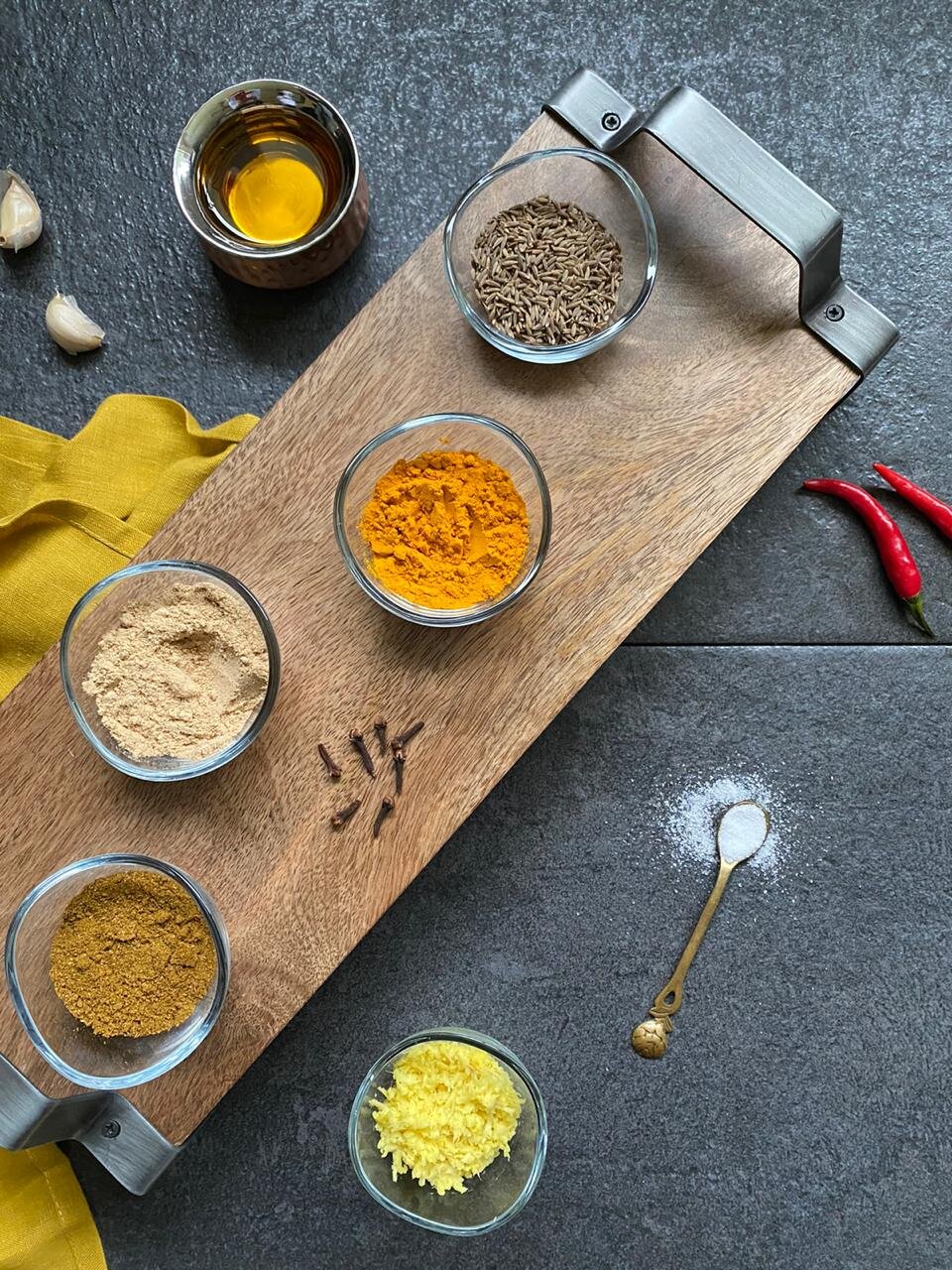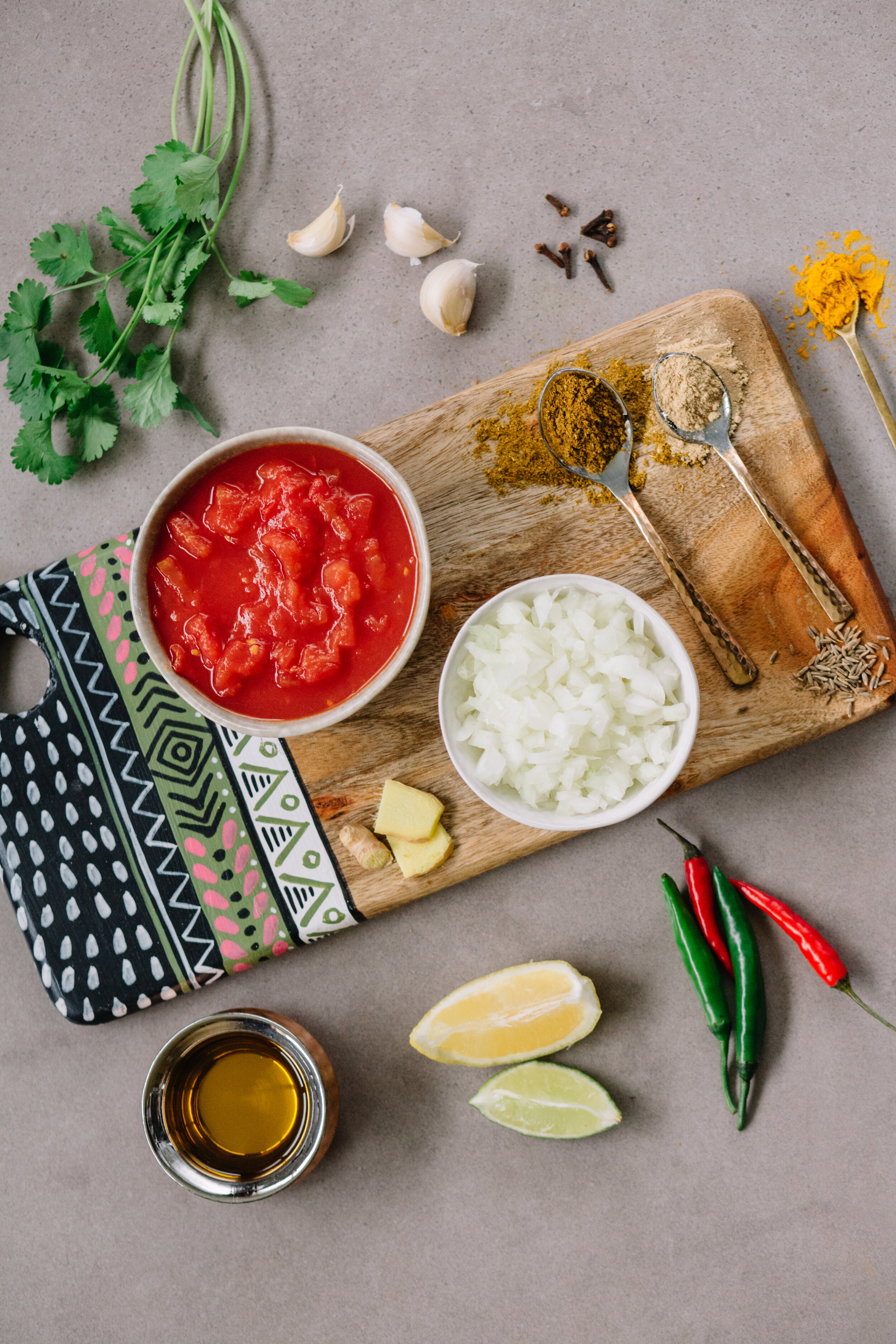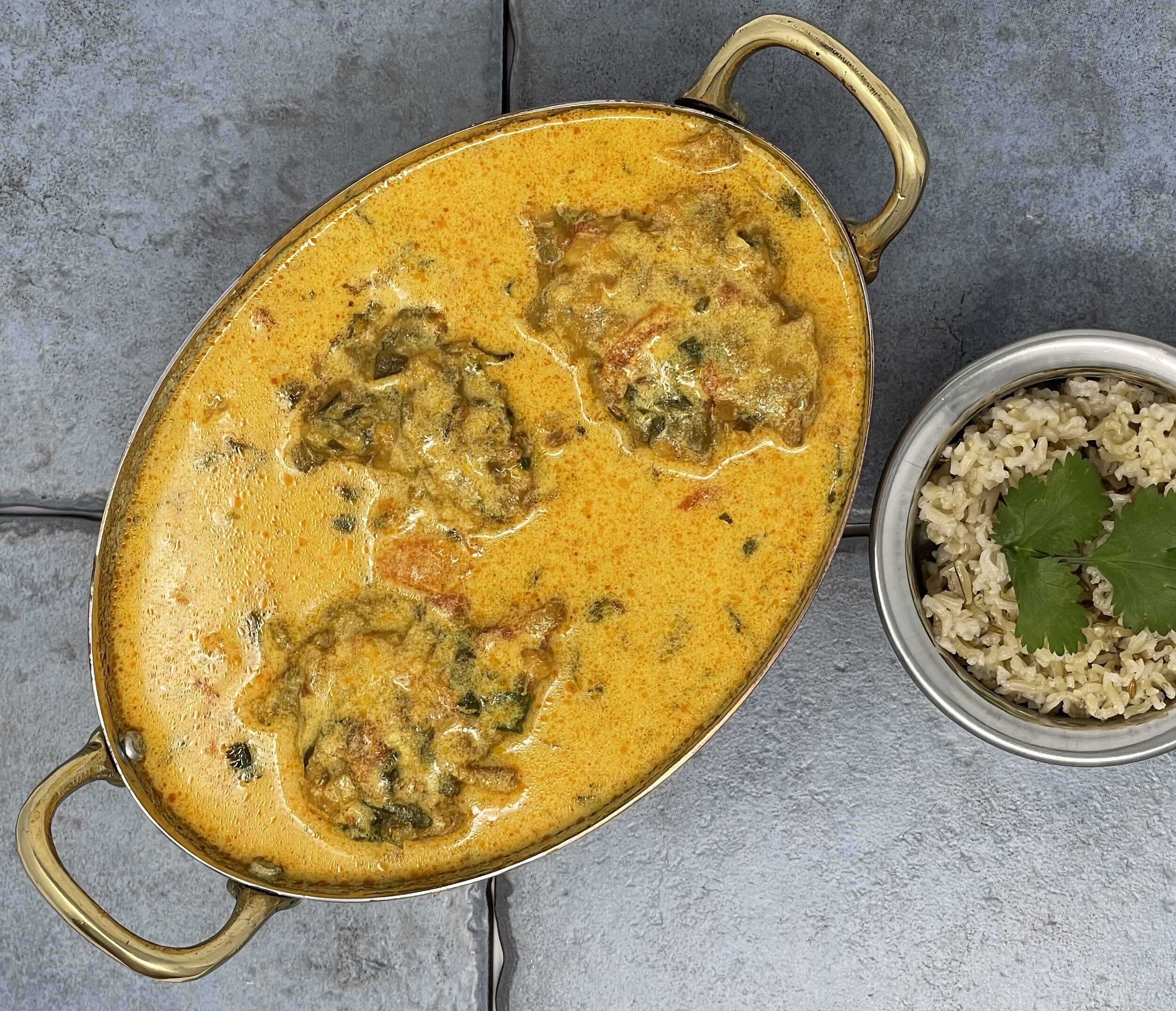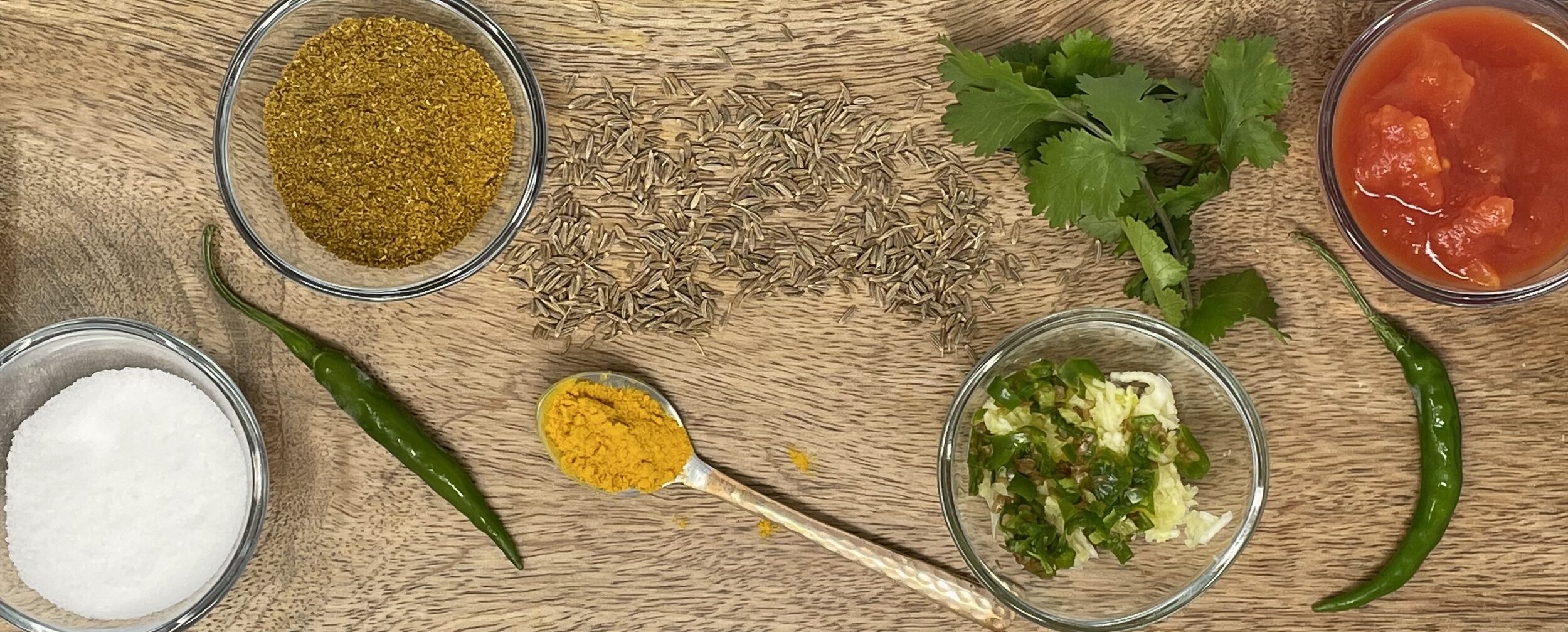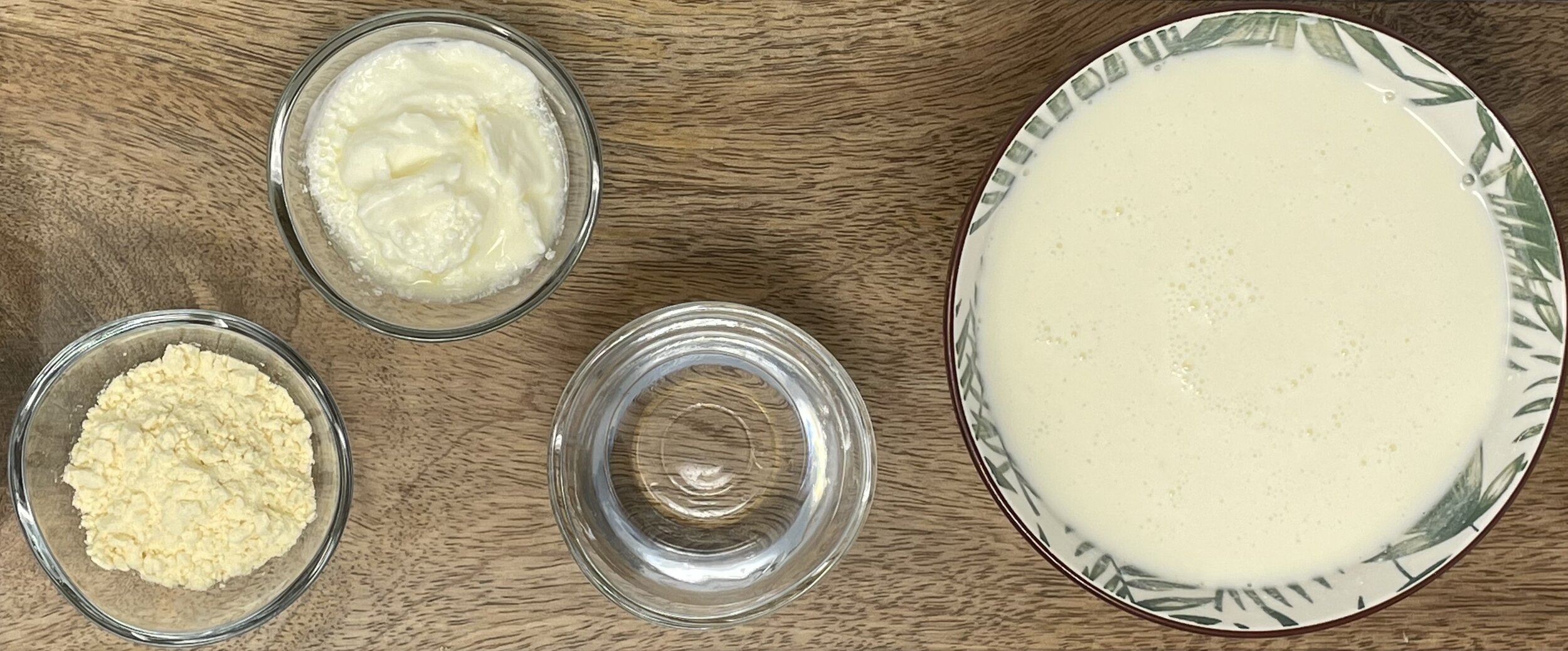Red Lentil Courgette Dal
erves: 4
Preparation time: 10 minutes. Total cooking time: 70 minutes.
Suitable for: Vegetarians, vegans (use vegetable oil instead of ghee/butter) and those on a gluten free diet
Serve piping hot with Aloo Gobi , Fine Beans and Potato curries, Bhindi; rotis or paranthas and plain boiled brown rice
Red Lentils & Courgette Dal
Ingredients:
3 tablespoons vegetable oil or ghee
1 teaspoon cumin seeds
4 whole cloves
1 medium onion, chopped finely
200g tinned plum peeled whole or chopped tomatoes or 3 fresh tomatoes skinned and chopped roughly
1½ - 2 chillies (green finger), chopped finely
2 level teaspoons salt
½ - ¾ teaspoon turmeric (haldi) - add higher amount if using fresh tomatoes
½ teaspoon of garam masala
2 cloves of garlic, crushed
1 inch piece of fresh ginger, peeled and grated finely
4 - 6 dried or fresh bay leaves
140g red lentils, sorted (to remove stones etc), washed and drained
240g courgettes, peeled and grated
850ml - 900ml water
handful of chopped fresh coriander
Juice of half a lemon/lime to taste
garnish fresh coriander leaves, optional
Method:
Heat the oil (butter or ghee) on medium heat until fairly hot (be careful with butter/ghee as these have lower smoking points). Add the cumin seeds and cloves and stir until they splutter (virtually immediately)
Turn the heat down to low/medium, add the onions and fry gently stirring occasionally until they soften.
Add the tomatoes, salt, turmeric, chillies, garlic, ginger stir. Continue to cook gently, ‘mashing’ the tomatoes until a paste like consistency forms. I use a potato masher.
Add the garam masala, stir and cook for a further minute or so or until oil oozes out of the paste when a wooden spoon is dragged along the base of the pan
Add the red lentils and courgettes, mix together to coat with the tarka.
Add the water, stir and bring to the boil.
Lower the heat, place a lid on the pan and simmer gently for 20 minutes stirring occasionally.
Add the lemon juice and chopped coriander. Bring back to the boil on gentle heat.
Take off the heat. Serve piping hot garnished with fresh coriander leaves and a drizzle of oil with plain boiled rice and chapattis.
Marrow Kofta Curry
Serves: 4
The koftas can be made in advance.
Koftas:
Preparation time: 15 minutes Frying time: about 20 minutes
Tarka:
Preparation time: 10 minutes. Cooking time: 30 minute.
Total time (for whole dish): 70 minutes though elements of the koftas can be carried out whilst the tarka is being made thus saving on total dish time.
Suitable for: Vegetarians, vegans and those on a gluten free diet
Serve piping hot with any flatbread and plain boiled brown rice
Marrow Kofta Curry
Ingredients:
Tarka
3 tablespoons of vegetable oil or ghee
1 teaspoon of cumin seeds
4 cloves
1 medium sized onions (c. 150g), halved horizontally and sliced thinly
200g tinned tomatoes or 3 medium tomatoes - skinned and chopped roughly
1½ green chillies, chopped finely
2 garlic cloves, peeled and crushed
1½ level teaspoons of salt
½ - ¾ level teaspoon of turmeric (use the higher amount if using fresh tomatoes)
¼ - ½ level teaspoon of garam masala
1 inch fresh ginger, peeled and grated finely
800ml water
handful of chopped coriander leaves
Marrow Koftas:
600g marrow (weight after soft centre removed and discarded), peeled and grated coarsely. Can be made with courgettes instead of marrow.
1 chillies (green finger), chopped finely
1 teaspoons salt
¼ teaspoon haldi (turmeric)
½ teaspoon of garam masala
1 clove garlic, crushed
a handful chopped coriander
150g gram flour, sifted
10 - 20ml water, if needed
Oil (rapeseed/vegetable) for deep fat frying.
Method:
Tarka:
Heat the oil on medium heat until fairly hot. Add the cumin seeds and cloves and stir until they splutter (virtually immediately)
Turn the heat down to low/medium, add the onions and fry gently stirring occasionally until they soften.
Add the tomatoes, salt, turmeric, chillies, garlic, ginger stir. Continue to cook gently, ‘mashing’ the tomatoes until a paste like consistency forms. I use a potato masher.
Add the garam masala, stir and cook for a further minute or so or until oil oozes out of the paste when a wooden spoon is dragged along the base of the pan
Koftas:
Quarter marrow, peel and remove the soft centre and discard.
Wash and grate coarsely.
Place the grated marrow in a muslin cloth and squeeze out as much of the water as possible (save this juice to use in juices or to add to broth for risottos and soups)
Place the resulting ‘pulp’ in a bowl, add the spices EXCEPT the salt. Add the garlic and mix together, using your fingers
Add the sifted gram flour and mix it into the spiced marrow pulp. Add the coriander and remix.
Heat the oil in a wok (only use enough oil to cover a third of the wok and use the back burner) on medium to high heat. To test when hot enough, drop a very small amount of the mixture into the hot oil, it should rise within a second or two.
Just before frying add the salt and mix thoroughly. The salt will cause the juices from the grated marrow to ooze out and should be enough to bind the mixture. If not, add a very small amount of water.
Scoop the mixture into a dessertspoon using a teaspoon to make a ‘mound’ in the dessertspoon. Gently drop this ‘mound’ into the hot oil guiding the mixture as you drop it in so it drops as a ‘mound’ rather than spreads out. Depending on the diameter of your wok, drop a number of these mounds into the hot oil ensuring there is sufficient room to turn the fritters over in the oil readily.
Fry on medium to high heat. When the fritters rise in the oil, turn them over. Continue turning them over every so often until they are golden brown in colour on both sides.
Drain, remove from the oil and place on absorbent kitchen paper.
Repeat the process from No. 5 above until all the batter has been used (makes 12 koftas)
Putting it all together:
Add the water to the tarka, stir and bring to the boil. Turn down the heat to a gentle boil.
Gently drop the koftas in the koftas one at a time. Stir very gently and lightly lifting each kofta as you do so.
Bring back to simmering point. Place the lid on the pan and simmer gently for 5 minutes.
Add the chopped coriander. Stir in very gently as above so as not to break up the koftas. Replace lid and simmer for another 5 minute or so.
Take off the heat and serve with rice and a flatbread of choice
Courgette & Potato Curry
Serves: 4
Preparation time: 15 minutes. Cooking time: 45 minute.
Suitable for: Vegetarians, vegans and those on a gluten free diet.
Serve with rotis or paranthas and plain boiled wholegrain rice
Courgette & Potato Curry with Plain Boiled Wholegrain Rice
Ingredients:
Tarka
3 tablespoons of vegetable oil or ghee
1 teaspoon of cumin seeds
4 cloves
2 small/medium sized onions (c. 150g), sliced thinly
200g tinned tomatoes or 3 medium tomatoes - skinned and chopped roughly
1½ - 2 green chillies, chopped finely
2 garlic cloves, peeled and crushed
2 level teaspoons of salt
½ - ¾ level teaspoon of turmeric (use the higher amount if using fresh tomatoes)
¼ - ½ level teaspoon of garam masala
1 inch fresh ginger, peeled and grated finely
Courgettes & Potato
300g courgettes, peel, slice in half vertically and then slice each half finely horizontally (half moon shape, a couple of mm thick)
300g waxy potatoes (I use new potatoes or Charlottes), peeled, cut in half inch cubes and rinsed to remove the starch
550ml water, approximately
4 bayleaves (fresh or dried), optional
Handful of chopped coriander.
Method:
Heat the oil on medium heat until fairly hot. Add the cumin seeds and cloves and stir until they splutter (virtually immediately)
Turn the heat down to low/medium, add the onions and fry gently stirring occasionally until they soften.
Add the tomatoes, salt, turmeric, chillies, garlic, ginger stir. Continue to cook gently, ‘mashing’ the tomatoes until a paste like consistency forms. I use a potato masher.
Add the garam masala, stir and cook for a further minute or so or until oil oozes out of the paste when a wooden spoon is dragged along the base of the pan
Add the sliced courgettes to the tarka and stir to combine. Place the lid on the pan and cook gently for about five minutes stirring occasionally.
Add the potatoes, stir to combine, and cook for a further five minutes with the lid on the pan.
Add the water. Bring to the boil. Add the bayleaves.
Turn down the heat to low/medium and bring back to simmering point. Place the lid on the pan and simmer gently for 20 minutes stirring occasionally.
Remove the bayleaves.
Add the chopped coriander. Bring back to the boil on gentle heat, simmer for a minute or so.
Take off the heat
Serve piping hot garnished with fresh coriander leaves.
Arbi (taro root) Masala
Serves 4 as a side dish
Prep: 20 minutes
Roasting: 35-40 minutes Total: 65 minutes
Vegetarian, vegan and those on a gluten-free diet
Serve as a side dish with one of the dals.
Traditionally the chipped arbi and potatoes are deep fried before adding to the ‘masala’. In this recipe I have roasted them for a healthier option for those on a low fat diet.
Arbi Masal
Ingredients:
600g Arbi (taro root) or eddoes (about 8 individual arbis)
450g small waxy potatoes
3 tablespoons vegetable oil
Masala:
3 tablespoons vegetable oil
2 teaspoons cumin
1 medium onion, coarsely grated or chopped very finely using a food processor
3 tablespoons chopped tomatoes, tinned or fresh
1½ green chillies, chopped
2 cloves garlic, crushed
1¾ teaspoons salt
½ teaspoon turmeric
¼ teaspoon garam masala
handful of chopped coriander leaves
lime juice, optional
Method:
Preheat the oven to 180 - 200°C/400°F/Gas Mark 6
Peel the arbi, wash, dry each one with a clean tea towel and slice lengthways as you would for chunky chips.
Peel the potatoes, slice lengthways, was and dry lightly in a clean tea towel
Place the prepared arbi and potatoes in large bowl. Add 3 tablespoons of oil and mix gently but thoroughly to coat the vegetables
Place on a baking tray and into the oven for approximately 35 - 40 minutes turning the arbi and potatoes over half way through roasting
Meanwhile make the masala. Heat the oil on medium heat until fairly hot (be careful with butter/ghee as these have lower smoking points). Add the cumin seeds and cloves and stir until they splutter (virtually immediately)
Turn the heat down to low/medium, add the onions and fry gently stirring occasionally until they soften.
Add the tomatoes, salt, turmeric, chillies, garlic, ginger stir. Continue to cook gently, ‘mashing’ the tomatoes until a paste like consistency forms. I use a potato masher.
Add the garam masala, stir and cook for a further minute or so or until oil oozes out of the paste when a wooden spoon is dragged along the base of the pan
Add the roasted arbi and potatoes to the masala, stir to combine with the masala.
With the lid on the pan, cook on low/medium heat for a couple of minutes.
Stir and add the chopped coriander.
Stir to combine then cook, the lid on for a further two minutes.
Remove from heat and serve with a squeeze of lime juice (optional), a dal dish, paranthas/roti and yoghurt.
Stuffed Karela (Bitter Gourd)
Makes 8 small stuffed Karelas
Prep: 10 minutes Stuffing: 20 minutes. Frying: 20 minutes
Total: 40 - 50 minutes.
Vegetarian, vegan and those on a gluten-free diet
Serve as a side dish with one of the dals
Stuffed Karelas (Bitter Gourds)
Raw Karelas ready for shallow frying
Ingredients:
8 small bitter gourds
2 - 3 teaspoons salt
white cotton thread/kitchen twine
oil for shallow frying or bake in the oven liberally coated with a vegetable oil
Filling:
3 tablespoons vegetable oil
1½ teaspoons cumin
2 medium onions, coarsely grated or chopped very finely
4 tablespoons chopped tomatoes, tinned or fresh
1½ teaspoons salt
¾ teaspoon turmeric
¼ teaspoon garam masala
1 - 2 garlic cloves, crushes or grated finely
handful of chopped coriander leaves
Method:
Top and tail the bitter gourds, then scrape off the knobbly bits
Slit open the bitter gourds lengthways and remove any of the hard seeds, the soft ones can remain.
Rub some salt on the outside and inside of the bitter gourds and set aside for 15 minutes
Meanwhile make the filling. Heat the oil (butter or ghee) on medium heat until fairly hot (be careful with butter/ghee as these have lower smoking points). Add the cumin seeds and stir until they splutter (virtually immediately)
Turn the heat down to low/medium, add the onions and fry gently stirring occasionally until they soften.
Add the tomatoes, salt, turmeric, chillies, garlic and stir. Continue to cook gently, ‘mashing’ the tomatoes until a loose paste like consistency forms. I use a potato masher.
Add the garam masala, stir and cook for a further minute or so or until you can see the oil oozing out of the paste. Add the chopped coriander and stir through for a minute or two.
Rinse the bitter gourds thoroughly under running water both on the outside and inside, removing any seeds that have come loose gently.
Drain the bitter gourds and squeeze with your hands to remove any excess water finishing off with a squeeze using kitchen paper and set aside.
Cut the cotton thread/twine into 8 sections approximately 2 meters in length and set aside.
Using a teaspoon stuff each bitter gourd with the masala, three to four teaspoons should suffice depending on the size of the bitter gourd.
Taking one length of the cotton thread/twine wind this tightly around the length of the stuffed bitter gourd and set aside.
Repeat steps 8 and 9 until all the bitter gourds have been prepared.
Pour about half a cup of oil (rapeseed or mustard) to the frying pan to a depth of approximately half a centimetre and heat on medium heat.
Lower the bitter gourds into the oil and fry gently on medium heat until lightly golden in colour, turning occasionally to ensure all sides have been fried and cooked. TIP: take care as will splutter so best to fry on the back burner or bake in the oven - see below)
Remove and drain on kitchen paper. Remove the cotton thread/twine.
Alternatively, brush the stuffed karelas liberally with a vegetable oil and place in an oven heated to 180°C/350°F/Gas Mark 6 for 45 - 60 checking theme and turning them over occasionally until soft when pierced with a skewer and browned..
Serve with roti/paranthas and a dal
Spicy Whole Baby Aubergines/Baby Potatoes
Serves 4 as a side dish
Prep: 15 minutes Total: 45 - 50 minutes
Vegetarian, vegan and those on a gluten-free diet
Serve with any dal dish, flatbread and rice
Ingredients:
12 baby aubergines
16 baby new potatoes
oil for deep frying
Spicy Baby Aubergines/Baby Potatoes served here with Gram Flour ‘Rotis’
Masala:
2 tablespoons vegetable oil
1 teaspoon cumin
1 medium onion, coarsely grated or chopped very finely
3 tablespoons chopped tomatoes, tinned or fresh
2 cloves garlic, crushed
1½ green chilli, deseeded and chopped
2 teaspoons salt
½ teaspoon turmeric
¼ teaspoon garam masala
handful of chopped coriander leaves
Method:
Remove the stalk of the aubergines, wash and pat dry with a clean tea towel.
Keeping each aubergine intact, slice lengthways in a cross from top of aubergine to about 1.5 cm from the bottom (stalk end). Set aside.
Peel the potatoes, keeping them whole wash and pat dry.
As with the aubergines, slice lengthways in a cross formation to about 1 cm from the bottom. Set aside.
Pour oil for deep frying in a wok up to a third way up from the bottom and heat on medium to hot heat.
Test the oil is hot enough by dropping a small amount of aubergine flesh in it. If it rises immediately, the oil is hot enough.
Gently place the aubergines in the hot oil on medium to high heat. Once they rise up, fry then for 5 minutes turning them over half way through.
Drain on kitchen paper.
Gently place the whole potatoes in the oil. Turn down the heat a touch and fry the potatoes for about 8 until light golden in colour. Drain on kitchen paper.
Whilst the vegetables are frying, make the masala. Heat the oil (butter or ghee) on medium heat until fairly hot (be careful with butter/ghee as these have lower smoking points). Add the cumin seeds and cloves and stir until they splutter (virtually immediately)
Turn the heat down to low/medium, add the onions and fry gently stirring occasionally until they soften.
Add the tomatoes, salt, turmeric, chillies, garlic, ginger stir. Continue to cook gently, ‘mashing’ the tomatoes until a paste like consistency forms. I use a potato masher.
Add the garam masala, stir and cook for a further minute or so or until the paste separates when a wooden spoon is dragged along the base of the pan.
Add a handful of chopped coriander, mix it through the paste and cook for a minute or two.
Place the fried vegetables into the masala, mix gently with two spatulas as when mixing a salad.
Place the lid on the pan, turn down the heat to a low/medium setting and allow to the steam to combine the masala and the vegetables for a couple of minutes.
Turn off heat and enjoy.
Saag Aloo/Paneer/Tofu
Serves 4
Prep: 10 mins. Cooking: 40 - 50 mins (the paneer and tofu can be fried whilst the spinach and tarka are cooking) plus paneer making time if not made ahead of time or using shop bought paneer.
Traditional saag is made with fresh spinach, mustard and fenugreek leaves but if these are not available then by all means use frozen spinach, making sure it is the tender baby spinach variety. For those wishing to make traditional North Indian saag I have listed the ingredients below in italics.
Vegetarian, vegan and those on a gluten-free diet
Serve with chapatis or paranthas, rice and a dal if needed
Saag Aloo made with fresh greens (first crop) from the garden…
Ingredients:
1kg frozen whole leaf spinach (preferably baby spinach) plus 300g frozen broccoli heads, defrosted OR (fresh greens made up of 400g spinach leaves, 400g mustard leaves and leaves from one large bunch of fenugreek, washed and chopped)
100ml water, (250ml water)
30g chickpea flour, sifted
250g paneer, preferably home made or tofu. (Can be made ahead of time, fried lightly and frozen until needed) OR 300g of waxy potatoes cubed (small cubes about 1cm in size parboiled for 5 minutes)
Tarka ingredients:
50g ghee/butter/Vegan Block butter (I use Naturli Vegan Block Butter)
2 teaspoons cumin
1 small onion
1 medium/large plum tomato, skinned and chopped or 3 tablespoons of canned chopped tomatoes
2 cloves of garlic
1½ - 2 green chillies
2 teaspoons salt
½ teaspoon turmeric
¼ teaspoon garam masala
Method:
Place the defrosted spinach (including the water from the defrosted spinach) or fresh greens and the corresponding amount of water into a pressure cooker. Add an additional 100ml of water.
Pressure cook for 10 minutes from when the pressure is achieved in the pressure cooker. After the 10 minutes are up, turn off the heat and allow to cool. Ensure no pressure remains in the pressure cooker before taking off the lid.
In a separate pan parboil the cubed potatoes (for saag aloo) for about five minutes.
Whilst the spinach is cooking, in a separate pan, make the tarka. Heat the butter or ghee on medium heat until fairly hot (be careful with butter/ghee as these have lower smoking points). Add the cumin seeds and cloves and stir until they splutter (virtually immediately)
Turn the heat down to low/medium, add the onions and fry gently stirring occasionally until they soften.
Add the tomatoes, salt, turmeric, chillies, garlic, ginger stir. Continue to cook gently, ‘mashing’ the tomatoes until a paste like consistency forms. I use a potato masher.
Add the garam masala, stir and cook for a further minute or so or until oil oozes out of the paste when a wooden spoon is dragged along the base of the pan
Cube and either shallow or deep fry the paneer or tofu (for saag paneer or saag tofu) until lightly golden in colour. Drain on kitchen paper and set aside.
Once the spinach has cooled down, add the sifted chickpea flour, stir gently and then blitz with a hand held blender for a couple of minutes until the spinach is smooth.
Add the spinach/chickpea flour mixture to the tarka, stir to combine. Cook with the lid on for a couple of minutes.
Add the fried paneer or potatoes, stir and combine with the spinach.
Simmer gently with the lid on for 20 - 30 minutes or so stirring occasionally. If it starts to stick to the bottom of the pan towards the end of the cooking time, turn down the heat, remove the lid and stir more often until all the liquid has evaporated.
The saag paneer/tofu/aloo is ready when a wooden spoon is dragged through the mixture leaves an almost clear channel. Droplets of ghee may also be visible.
Serve hot. Finger licking delicious!
Mutter Tofu (Vegan version of Mutter Paneer)
Mutter Tofu - a vegan version of Mutter Paneer
Serves: 4 Preparation time: 10 minutes. Cooking time: 45 minute.
Suitable for: Vegetarians, vegans and those on a gluten free diet.
Serve with rotis or paranthas and plain boiled brown rice
Mutter Tofu
Ingredients:
Tarka
3 tablespoons of vegetable oil or ghee
1 teaspoon of cumin seeds
4 cloves
1 medium sized onion, chopped finely
200g tinned tomatoes or 3 medium tomatoes - skinned and chopped roughly
1½ - 2 green chillies, chopped finely
2 garlic cloves, peeled and crushed
2 level teaspoons of salt
½ - ¾ level teaspoon of turmeric (use the higher amount if using fresh tomatoes)
½ level teaspoon of garam masala
1 inch fresh ginger, peeled and grated finely
Mutter Tofu
380g of shelled fresh peas, rinsed and drained (fresh peas give a ‘bite’ to this dish but frozen peas can be used in the absence of fresh. Frozen peas also give a sweeter flavour)
600ml water, approximately
320g of cubed tofu, lightly fried either shallow or deep fried. I used Cauldrons Organic Tofu.
Handful of chopped coriander.
Method:
Heat the oil (butter or ghee) on medium heat until fairly hot (be careful with butter/ghee as these have lower smoking points). Add the cumin seeds and cloves and stir until they splutter (virtually immediately)
Turn the heat down to low/medium, add the onions and fry gently stirring occasionally until they soften.
Add the tomatoes, salt, turmeric, chillies, garlic, ginger stir. Continue to cook gently, ‘mashing’ the tomatoes until a paste like consistency forms. I use a potato masher.
Add the garam masala, stir and cook for a further minute or so or until oil oozes out of the paste when a wooden spoon is dragged along the base of the pan
Add the peas to the tarka and stir to combine. Place the lid on the pan and cook gently for about 5 - 10 minutes stirring occasionally.
Add 600ml water. Bring to the boil. Turn down the heat to low/medium, add the tofu and bring back to simmering point. Place the lid on the pan and simmer gently for 20 minutes stirring occasionally.
Add the chopped coriander. Bring back to the boil on gentle heat, simmer for a minute or so.
Take off the heat. Serve piping hot garnished with fresh coriander leaves.
Kala Chana (Black Chickpeas)
Serves: 4
Preparation time: 10 minutes. Cooking time: 45 minute. Soaking time: kala chana, overnight (minimum 8 hours)
Suitable for: Vegetarian, vegan (use vegetable oil instead of ghee/butter) and those on a gluten free diet
Serve piping hot with any of the Indian breads and plain boiled brown rice
Ingredients:
Tarka
3 tablespoons vegetable oil or ghee/butter
1 tablespoon cumin seeds
6 whole clove
1 medium onion, chopped finely
200g tinned plum peeled chopped tomatoes or 4 fresh tomatoes skinned and chopped
1½ - 2 chillies (green finger), chopped finely
2 level teaspoons salt
½ - ¾ teaspoon haldi (turmeric) - add the higher amount if using fresh tomatoes.
½ teaspoon of garam masala
2 cloves of garlic, crushed
1 inch piece of fresh ginger, peeled and grated finely
Kala Chana
230g of dried kala chana, rinsed and soaked in water overnight.
600 - 650ml water
handful of chopped fresh coriander
Method:
Preparation of dried kala chana:
Sort the kala chana to remove chaff/debris, rinse and soak overnight.
The next day, drain the soaked chana and rinse several times. Pour 600ml of water to a pressure cooker, add the chana and pressure cook for 20 minutes. Cool before opening the pressure cooker.
Whilst the chana are being pressure cooked, make the tarka in a separate pan.
Heat the oil (butter or ghee) on medium heat until fairly hot (be careful with butter/ghee as these have lower smoking points). Add the cumin seeds and cloves and stir until they splutter (virtually immediately)
Turn the heat down to low/medium, add the onions and fry gently stirring occasionally until they soften.
Add the tomatoes, salt, turmeric, chillies, garlic, ginger stir. Continue to cook gently, ‘mashing’ the tomatoes until a paste like consistency forms. I use a potato masher.
Add the garam masala, stir and cook for a further minute or so or until oil oozes out of the paste when a wooden spoon is dragged along the base of the pan
Add the tarka to the pressure cooked chana, stir and bring back to the boil.
Turn down the heat to low/medium and cover the pan with a lid. Simmer gently for 20 minutes stirring occasionally.
Add chopped coriander. Bring back to the boil once again, then turning the heat down simmer for a minute or so.
Serve piping hot .
Bhindi (Okra)
Serves: 4 as a side dish or 2 - 3 as a main dish
Preparation time: 20 minutes.
Cooking time: 30 minutes
Suitable for: Vegetarians, vegans and those on a gluten free diet
Serve piping hot with rotis/paranthas; a dal dish; rice and yoghurt (plant based if vegan)
Ingredients:
500g fresh okra
40ml vegetable oil
1 teaspoon jeera (cumin seeds)
2 medium onions, sliced thinly lengthways
1 medium tomato, skinned and chopped roughly or 2 level tablespoon canned chopped tomatoes
1 - 2 green chillies, chopped finely
2 cloves of garlic, crushed
1¼ - 1½ level teaspoons of salt
½ teaspoon of turmeric
¼ teaspoon of garam masala
¼ teaspoon of amchur or 1 teaspoon of lemon juice, optional
Method:
Wash the bhindi, drain and dry each individual bhindi with a clean tea towel.
Top and tail each bhindi, cut in half horizontally and then quarter each half vertically.
Make the tarka which is less time consuming than for other curries because of the lower tomato/moisture content.
Heat the oil (butter or ghee) on medium heat until fairly hot (be careful with butter/ghee as these have lower smoking points). Add the cumin seeds and cloves and stir until they splutter (virtually immediately)
Turn the heat down to low/medium, add the onions and fry gently stirring occasionally until they soften.
Add the tomatoes, salt, turmeric, chillies, garlic, ginger stir. Continue to cook gently, ‘mashing’ the tomatoes until a paste like consistency forms. I use a potato masher.
Add the garam masala, stir and cook for a further minute or so or until oil oozes out of the paste when a wooden spoon is dragged along the base of the pan
Add the prepared okra and combine with the tarka.
With the heat on medium, place the lid on the pan keeping it slightly ajar. Simmer for about 10 minutes stirring occasionally.
After 10 minutes or so, the contents may start sticking to the bottom of the pan. At this time, remove the lid completely, turn down the heat a touch and continue cooking, stirring occasionally until the oil starts to ooze (another 5 minutes or so).
When cooked, add the amchur or lemon juice if using - this takes away the ‘sliminess’, stir for a minute or so.
Turn off the heat and serve hot.
Stuffed Peppers
A yummy spicy alternative to the traditional rice stuffed peppers…
Serves: 4
Preparation time: 25 minutes including time taken to boil the potatoes and make the base which can be done side by side)
Baking time: 45 to 60 minutes at 190°C/375°F/Gas mark 5
Suitable for: Vegetarians, vegans and those on a gluten free diet
Serve piping hot with traditional wheat flour roti or paranthas, a dal dish; rice and yoghurt (plant based if vegan)
Ingredients:
4 small green peppers
1 tablespoon of vegetable oil
1 bunch of spring onions or one small onion
1 medium tomato, skinned and chopped roughly or 1 tablespoon of canned chopped tomatoes
1 green chilli, chopped finely
2 cloves of garlic, crushed
500g new potatoes or other waxy potato variety
1¾ level teaspoons of salt
½ teaspoon of turmeric
¼ teaspoon of garam masala
½ teaspoon of amchoor (dried mango powder)
40g frozen sweetcorn, defrosted
40g frozen peas, defrosted
handful of chopped coriander
Method:
Add enough water to the potatoes in the pan to cover the potatoes and about half an inch above. Bring to he boil, then cover and simmer gently until soft (20 minutes).
Drain, cool, peel off the skins and mash
In the meantime, chop the spring onions finely and gently fry in the oil until they soften.
Add the chopped tomato, salt, garlic, chilli and haldi. Stir to incorporate and continue cooking gently for a couple of minutes. Add the garam masala and amchoor and stir again.
Add the defrosted sweetcorn and peas and cook gently for a few minutes. Then add the mashed potatoes stir to combine all the ingredients together. Cook on low heat stirring occasionally for about 10 minutes.
Add the coriander and combine into the potato filling. Cook for a couple of minutes. Take off the heat and set aside
Turn the oven on at 190°C/375°F/Gas mark 5
Wash and dry the peppers. Slit in half keeping the peppers intact at the stalk end. Scoop out the seeds
Divide the potato filling into 4 portions and stuff each pepper. Once filled, press the two halves of each pepper together to form one pepper again.
Brush the outside of each pepper with vegetable oil, place on a baking tray lined with aluminium foil and bake in the preheated oven for 45 - 60 minutes (depending on how ‘well done’ you prefer your peppers) turning the peppers over half way through baking time. The skin should be charred, crisp and brown in places.
Remove from the oven and serve. I serve these with a dhal of some sort, plain boiled brown rice and roti either traditional wheat flour or besan if gluten free.
Fine Beans and Potato Curry
Serves: 4
Preparation time: 45 minutes. Cooking time: 45 minute
Suitable for: Vegetarians, vegans and those on a gluten free diet
Serve piping hot with traditional wheat flour roti or paranthas, a dal dish; rice and yoghurt (plant based if vegan)
Ingredients:
Tarka:
40ml vegetable oil
1 tablespoon cumin seeds
2 small onions, finely sliced
50g tinned tomatoes or medium sized fresh tomato, skinned and chopped
2 - 3 chillies (green finger), chopped finely
2 level teaspoons salt
½ - ¾ teaspoon haldi (turmeric) - add the higher amount if using fresh tomatoes
2 cloves of garlic, crushed
½ teaspoon of garam masala
2 cloves of garlic, crushed
Curry:
400g of fine beans, topped/tailed, chopped finely, rinsed and drained
500g small waxy potatoes, diced, rinsed and drained
Method:
Heat the oil (butter or ghee) on medium heat until fairly hot (be careful with butter/ghee as these have lower smoking points). Add the cumin seeds and cloves and stir until they splutter (virtually immediately)
Turn the heat down to low/medium, add the onions and fry gently stirring occasionally until they soften.
Add the tomatoes, salt, turmeric, chillies, garlic, ginger stir. Continue to cook gently, ‘mashing’ the tomatoes until a paste like consistency forms. I use a potato masher.
Add the garam masala, stir and cook for a further minute or so or until oil oozes out of the paste when a wooden spoon is dragged along the base of the pan
Add the beans, stir to combine with the tarka. Place the lid on the pan and cook on medium heat for 10 minutes stirring occasionally.
Add the potatoes, stir to combine. With the lid on the pan, continue to cook gently for about 30 minutes stirring occasionally until the potatoes and beans have cooked through and splutters of oil can be seen on the base of the pan when the wooden spoon is dragged through the contents. The beans and potatoes will also ‘glisten’ to indicate the dish is cooked.
Serve hot.
Aloo Gobi (Potatoes & Cauliflower)
Serves: 4
Preparation time: 20 minutes. Cooking time: 45 minute
Suitable for: Vegetarians and vegans
Serve piping hot with traditional wheat flour roti; a dal dish; rice and yoghurt (plant based if vegan)
Photos: Usha Gupta
Ingredients:
Tarka:
60ml of vegetable oil
1 tablespoon of cumin seeds
2 small onions, sliced finely,
100g tinned tomatoes or 1 medium/large tomato - skinned and chopped roughly
2 - 3 green chillies, chopped finely
2 garlic cloves, peeled and crushed
2 level teaspoons of salt
½ - ¾ level teaspoon of haldi (turmeric) - use the higher amount if using fresh tomatoes
½ level teaspoon of garam masala
Gobi Aloo:
I medium crisp cauliflower (approx. 850g without the outer leaves) cut into ¾ inch wide and 1½ inch long florets, rinsed and drained
400g new potatoes (or any other waxy variety) peeled, cubed (½ inch cubes) and rinsed
Handful of chopped coriander.
Method:
Heat the oil on medium heat until fairly hot (be careful with butter/ghee as these have lower smoking points). Add the cumin seeds and cloves and stir until they splutter (virtually immediately)
Turn the heat down to low/medium, add the onions and fry gently stirring occasionally until they soften.
Add the tomatoes, salt, turmeric, chillies, garlic, ginger stir. Continue to cook gently, ‘mashing’ the tomatoes until a paste like consistency forms. I use a potato masher.
Add the garam masala, stir and cook for a further minute or so or until oil oozes out of the paste when a wooden spoon is dragged along the base of the pan
Add the cauliflower florets and gently stir to coat with the tarka. Add the potatoes and again gently stir to combine.
With the lid very slightly ajar cook on low to medium heat stirring very gently occasionally by lifting the vegetables with a wooden spoon and turning them over gently. This is very important to avoid the Aloo Gobi becoming a ‘mash’ for 30 minutes until the Aloo and Gobi are cooked (test by passing a knife through each vegetable).
Remove the lid completely and turn the heat down a touch. Stir in the chopped coriander very gently. Allow any remaining moisture to evaporate until droplets of oil ooze out of the Aloo Gobi when the wooden spoon is dragged gently along the base of the pan through the dish.
Take off the heat. Serve piping hot garnished with fresh coriander leaves.
Chole (Chickpeas)
A firm family favourite with Bhaturas and rice
Video: Ale Armijos
Best made using dried chickpeas soaked overnight but works well with tinned chickpeas too if tight for time.
Serves: 4
Preparation time: 10 minutes. Cooking time: 55 minute. Soaking time: Chole 8 hours preferably overnight
Suitable for: Vegetarian, vegan (use vegetable oil instead of ghee/butter) and those on a gluten free diet
Serve piping hot with Bhaturas (not gluten free) and plain boiled brown rice (rice for a gluten free option)
Photos: Ale Armijos and Girish Gupta
Ingredients:
Tarka
3 tablespoons vegetable oil or ghee/butter
1 tablespoon cumin seeds
6 whole clove
1 medium onion, chopped finely
300g tinned plum peeled whole or chopped tomatoes or 4 fresh tomatoes skinned and chopped
1½ - 2 chillies (green finger), chopped finely
2 level teaspoons salt
½ - ¾ teaspoon haldi (turmeric) - add the higher amount if using fresh tomatoes.
½ teaspoon of garam masala
2 cloves of garlic, crushed
1 inch piece of fresh ginger, peeled and grated finely
Chole
3 x 400g tins of chole (chickpeas), rinsed and drained (or 230g of dried chole soaked in water for 6 - 8 hours preferably overnight).
500 - 600ml water if using precooked chickpeas (750ml if using soaked dried chole)
4 dried/fresh bay leaves (optional)
handful of chopped fresh coriander
1 teaspoon amchoor, dried mango powder (optional)
sliced red onion and coriander leaves to garnish
Method:
Preparation of dried chole:
Sort the chole to remove chaff/debris, rinse and soak preferably overnight
Rinse the soaked chole, add 750ml of water and pressure cook for 20 minutes. Cool before opening the pressure cooker.
Whilst the chole are being pressure cooked, make the tarka. Heat the oil (butter or ghee) on medium heat until fairly hot (be careful with butter/ghee as these have lower smoking points). Add the cumin seeds and cloves and stir until they splutter (virtually immediately)
Turn the heat down to low/medium, add the onions and fry gently stirring occasionally until they soften.
Add the tomatoes, salt, turmeric, chillies, garlic, ginger stir. Continue to cook gently, ‘mashing’ the tomatoes until a paste like consistency forms. I use a potato masher.
Add the garam masala, stir and cook for a further minute or so or until oil oozes out of the paste when a wooden spoon is dragged along the base of the pan
To the Tarka add the rinsed and drained tinned chole, stir and cook gently on medium heat for 5 minutes with the lid on the pan to help absorb some of the flavours.
NB: if using pressure cooked chole, tip the contents of the pressure cooker into the Tarka and continue from point 9 below.
Add the water (only if using tinned chole)
Stir turning up the heat bring to the boil.
Turn down the heat to low/medium heat, add the bay leaves. Place the lid on the pan and simmer gently for 20 minutes stirring occasionally.
Add the amchoor (if using) and chopped coriander. Bring back to the boil once again, then turning the heat down simmer for a minute or so.
Remove the bay leaves. Serve piping hot garnished with finely sliced red onions.
Tarka (Main Curry Base)
This yummy base is essential to most of my curry recipes.
Video: Ale Armijos
Serves: variable - dependant upon each recipe
Preparation time: 10 minutes. Cooking time: 30 minute.
Suitable for: Vegetarians, vegans (use vegetable oil instead of ghee/butter) and those on a gluten free diet
It is important to take the time to make the Tarka. The Tarka is at the heart of all the curries on this website.
Quantities of each ingredient may differ depending on the curry of choice and in some curries, some ingredients may be omitted and others added.
See each individual recipe for variations to these ingredients.
Ingredients:
Photos: Ale Armijos
Vegetable oil, ghee or butter depending on recipe
Cumin seeds
Whole cloves
Onion(s)
Tinned chopped tomatoes or fresh tomatoes skinned and chopped roughly
Chillies (green finger), chopped finely
Salt
Haldi (turmeric)
Garam masala
Garlic, crushed
Fresh ginger, peeled and grated finely
Method:
Heat the oil (butter or ghee) on medium heat until fairly hot (be careful with butter/ghee as these have lower smoking points). Add the cumin seeds and cloves and stir until they splutter (virtually immediately)
Turn the heat down to low/medium, add the onions and fry gently stirring occasionally until they soften.
Add the tomatoes, salt, turmeric, chillies, garlic, ginger stir. Continue to cook gently, ‘mashing’ the tomatoes until a paste like consistency forms. I use a potato masher.
Add the garam masala, stir and cook for a further minute or so or until oil oozes out of the paste when a wooden spoon is dragged along the base of the pan and there you have it, that all important base for all North Central Indian curries...
Mung Dal
Serves: 4
Preparation time: 25 minutes. Cooking/total time: 65 minute includes prep time
Gluten free, Vegetarian, Vegan (use vegetable oil instead of ghee/butter).
Serve with rotis/paranthas, brown wholegrain rice and a side dish of one of the ‘dry’ curries.
Mung dal with side garnish of red onions and tomatoes
Ingredients:
Tarka
3 tablespoons vegetable oil (use 40g butter/ghee to give a more flavoursome/creamy dhal)
1 teaspoon cumin seeds
4 whole cloves
1 medium onion, chopped finely
200g tinned plum peeled whole or chopped tomatoes or 3 fresh tomatoes skinned and chopped roughly
2 - 3 chillies (green finger), chopped finely
2 level teaspoons salt
½ - ¾ teaspoon turmeric (haldi) - add the higher amount if using fresh tomatoes
½ teaspoon of garam masala
2 cloves of garlic, crushed
1 inch piece of fresh ginger, peeled and grated finely
Mung Dal
230g mung dal, sorted and washed (to remove stones etc)
900ml water
handful of chopped fresh coriander
garnish with a knob of butter or ghee and fresh coriander leaves
Method:
Wash and rinse the dal and place in a deep pan with c. 900ml of water. Bring to the boil, turn the heat down to a low to medium setting. Cover the pan and simmer gently for 35 minutes.
Whilst the dal is simmering, make the tarka. Heat the oil (butter or ghee) on medium heat until fairly hot (be careful with butter/ghee as these have lower smoking points). Add the cumin seeds and cloves and stir until they splutter (virtually immediately)
Turn the heat down to low/medium, add the onions and fry gently stirring occasionally until they soften.
Add the tomatoes, salt, turmeric, chillies, garlic, ginger stir. Continue to cook gently, ‘mashing’ the tomatoes until a paste like consistency forms. I use a potato masher.
Add the garam masala, stir and cook for a further minute or so or until oil oozes out of the paste when a wooden spoon is dragged along the base of the pan
Add the tarka to the mung dal stir to combine. Bring back to the boil then turn down the heat to low/medium heat. Place the lid on the pan and simmer gently for 20 minutes stirring occasionally.
Add the chopped coriander. Bring back to the boil on gentle heat, simmer for a minute or so.
Serve piping hot garnished with fresh coriander leaves and a knob of ghee or butter with plain boiled rice and chapattis.
Notes:
Serve with a side dish of Saag Aloo/Gobi Aloo/Bhindi or Baby Bhangan Aloo.
Lobia (Black Eyed Bean) Curry
Serves: 4
Preparation time: 10 minutes. Soaking time (lobia beans): 8 hours preferably overnight. Cooking time: 55 minutes.
Suitable for: Vegetarians, vegans (use vegetable oil instead of ghee/butter) and those on a gluten free diet
Serve piping hot with rotis or paranthas and plain boiled brown rice
Ingredients:
Tarka
3 tablespoons vegetable oil (use 40g butter/ghee to give a more flavoursome/creamy dish)
1 tablespoon cumin seeds
4 whole cloves
1 medium onion, chopped finely
200g tinned plum peeled whole or chopped tomatoes or 3 fresh tomatoes skinned and chopped roughly
1½ - 2 chillies (green finger), chopped finely
2 level teaspoons salt
½ - ¾ teaspoon turmeric (haldi) - add higher amount if using fresh tomatoes
½ teaspoon of garam masala
2 cloves of garlic, crushed
1 inch piece of fresh ginger, peeled and grated finely
Lobia
230g dried lobia, sorted to remove chaff/debris, rinsed and soaked in fresh water for at least 8 hours preferably overnight
750ml water (500 - 600ml water if using tinned lobia)
To finish off
handful of chopped fresh coriander
garnish with a knob of butter or ghee and fresh coriander leaves
Method:
Drain the soaked lobia and pressure cook inn 750ml water
In the meantime make the tarka. Heat the oil (butter or ghee) on medium heat until fairly hot (be careful with butter/ghee as these have lower smoking points). Add the cumin seeds and cloves and stir until they splutter (virtually immediately)
Turn the heat down to low/medium, add the onions and fry gently stirring occasionally until they soften.
Add the tomatoes, salt, turmeric, chillies, garlic, ginger stir. Continue to cook gently, ‘mashing’ the tomatoes until a paste like consistency forms. I use a potato masher.
Add the garam masala, stir and cook for a further minute or so or until oil oozes out of the paste when a wooden spoon is dragged along the base of the pan
Add the pressure cooked lobia and liquid to the tarka, stir to combine. Bring back to the boil.
Turn down the heat to low/medium heat, place the lid on the pan and simmer gently for 20 minutes stirring occasionally.
Add the chopped coriander. Bring back to the boil on gentle heat and simmer for a minute or so.
Take off the heat. Serve piping hot garnished with fresh coriander leaves and a knob of ghee or butter.
Mutter Paneer/Tofu/Aloo
Use home made paneer wherever possible as this gives a more creamy, soft texture. Tofu can be used as vegan alternative and a third variation in mutter aloo.
Serves: 4 Preparation time: 10 minutes. Cooking time: 65 minute.
Suitable for: Vegetarians and those on a gluten free diet. Vegan version can be made using Tofu
Serve with rotis or paranthas and plain boiled brown rice
Mutter Paneer top right with Mutter Tofu (vegan) below left
Ingredients:
Tarka
3 tablespoons of vegetable oil or ghee
1 teaspoon of cumin seeds
4 cloves
1 medium sized onion, chopped finely
200g tinned tomatoes or 3 medium tomatoes - skinned and chopped roughly
1½ - 2 green chillies, chopped finely
2 garlic cloves, peeled and crushed
2 level teaspoons of salt
½ - ¾ level teaspoon of turmeric (use the higher amount if using fresh tomatoes)
½ level teaspoon of garam masala
1 inch fresh ginger, peeled and grated finely
Mutter Paneer/Tofu/Aloo
380g of shelled fresh peas, rinsed and drained (fresh peas give a ‘bite’ to this dish but frozen peas can be used in the absence of fresh. Frozen peas also give a sweeter flavour)
600ml water, approximately
320g of cubed and lightly fried paneer/tofu, drained access moisture removed gently by placing between a clean tea towel and lightly fried (or 380g of peeled and cubed waxy potatoes for mutter aloo)
Handful of chopped coriander.
Method:
Heat the oil (butter or ghee) on medium heat until fairly hot (be careful with butter/ghee as these have lower smoking points). Add the cumin seeds and cloves and stir until they splutter (virtually immediately)
Turn the heat down to low/medium, add the onions and fry gently stirring occasionally until they soften.
Add the tomatoes, salt, turmeric, chillies, garlic, ginger stir. Continue to cook gently, ‘mashing’ the tomatoes until a paste like consistency forms. I use a potato masher.
Add the garam masala, stir and cook for a further minute or so or until oil oozes out of the paste when a wooden spoon is dragged along the base of the pan
Add the peas to the tarka and stir to combine. Place the lid on the pan and cook gently for about 5 - 10 minutes stirring occasionally. (Add the potatoes if making mutter aloo, stir, cover the pot and cook gently for about 5 minutes)
Add 600ml water. Bring to the boil. Turn down the heat to low/medium, add the paneer/tofu (if making mutter paneer/tofu/) and bring back to simmering point. Place the lid on the pan and simmer gently for 20 minutes stirring occasionally.
Add the chopped coriander. Bring back to the boil on gentle heat, simmer for a minute or so.
Take off the heat. Serve piping hot garnished with fresh coriander leaves.
Dahi Pakora Kari (Yoghurt Pakora Curry)
Serves: 4
Preparation time for the curry itself: 10 minutes. Cooking time: 65 minute
Plus additional preparation and cooking time for the pakoras
Suitable for: Vegetarians, vegan (use vegetable oil instead of ghee/butter and plant based yoghurt instead of dairy) and those on a gluten free diet
Serve with plain boiled brown rice for a gluten free option
Ingredients:
Tarka
3 tablespoons of vegetable oil or ghee/butter
1 teaspoon of cumin seeds
6 whole cloves
1 medium sized onion, chopped finely
400g tinned tomatoes or 7 medium tomatoes - skinned and chopped roughly
2 - 3 green chillies, chopped finely
2 garlic cloves, peeled and crushed
2 level teaspoons of salt
¾ -1 level teaspoon of turmeric (use the higher amount if using fresh tomatoes)
½ level teaspoon of garam masala
1 inch fresh ginger, peeled and grated finely
Dahi Pakora Curry
750ml Water
12 small/medium pakoras
Handful of chopped coriander.
For the Dahi/Gram Flour batter:
450g/500g plain thick set yoghurt (or soya as non-dairy substitute)
40g besan (gram flour), sifted
500ml water
Method:
Pakoras:
Follow recipe for Pakoras
Dahi/|Gram Flour batter:
Place the yoghurt in a large bowl, add the sifted gram flour and water. Whisk to form thin batter like consistency. Set aside.
Curry:
Heat the oil (butter or ghee) on medium heat until fairly hot (be careful with butter/ghee as these have lower smoking points). Add the cumin seeds and cloves and stir until they splutter (virtually immediately)
Turn the heat down to low/medium, add the onions and fry gently stirring occasionally until they soften.
Add the tomatoes, salt, turmeric, chillies, garlic, ginger stir. Continue to cook gently, ‘mashing’ the tomatoes until a paste like consistency forms. I use a potato masher.
Add the garam masala, stir and cook for a further minute or so or until oil oozes out of the paste when a wooden spoon is dragged along the base of the pan
Pour the dahi/gram flour batter through a sieve into the tarka. Stir to combine. Add the additional 750ml water and stir again to incorporate.
Turn the heat up to high and bring the contents to the boil. It’s important to watch it at this point as can readily boil over. As soon as the contents look like they are reaching boiling point, turn the heat right down to prevent boil over. Once settled, turn the heat up to medium and allow contents to reach simmering point.
Add the pakoras, bring back to simmering point. Place the lid on the pan and continue to simmer for a further 20 minutes stirring occasionally gently so as not to break the pakoras.
Add the chopped coriander. Bring back to the boil on gentle heat and simmer for a minute or so.
Take off the heat. Serve piping hot garnished with fresh coriander leaves and plain boiled rice.
Urad & Rajma Curry (Black Lentil and Kidney Beans)
Serves: 4
Preparation time: 10 minutes. Soaking time (urad dal): 8 hours preferably overnight. Cooking time: 80 minutes.
Suitable for: Vegetarians, vegans (use vegetable oil instead of ghee/butter) and those on a gluten free diet
Serve piping hot with rotis or paranthas and plain boiled brown rice
Ingredients:
Tarka:
3 tablespoons vegetable oil (use 40g butter/ghee to give a more flavoursome/creamy dish)
1 teaspoon cumin seeds
4 whole cloves
1 medium onion, chopped finely
200g tinned plum peeled whole or chopped tomatoes or 3 fresh tomatoes skinned and chopped roughly
1½ - 2 chillies (green finger), chopped finely
2 level teaspoons salt
½ - ¾ teaspoon turmeric (haldi) - add higher amount if using fresh tomatoes
¼ - ½ teaspoon of garam masala
2 cloves of garlic, crushed
1 inch piece of fresh ginger, peeled and grated finely
230g urad dhal, sorted (to remove stones etc), rinsed and soaked in fresh water preferably overnight (8 hours mimimum)
900ml water
400g tin of kidney beans, drained and rinsed
handful of chopped fresh coriander
garnish with a knob of butter or ghee and fresh coriander leaves
Method:
Drain and rinse the soaked dhal and place in a deep pan with 900ml of water (enough water to cover the dhal plus a couple of inches above). Bring to the boil, turn down to heat to a low to medium setting. Cover the pan and simmer gently for about an hour.
Whilst the dhal is simmering, make the tarka. Heat the oil (butter or ghee) on medium heat until fairly hot (be careful with butter/ghee as these have lower smoking points). Add the cumin seeds and cloves and stir until they splutter (virtually immediately)
Turn the heat down to low/medium, add the onions and fry gently stirring occasionally until they soften.
Add the tomatoes, salt, turmeric, chillies, garlic, ginger stir. Continue to cook gently, ‘mashing’ the tomatoes until a paste like consistency forms. I use a potato masher.
Add the garam masala, stir and cook for a further minute or so or until oil oozes out of the paste when a wooden spoon is dragged along the base of the pan
Add the kidney beans to the tarka, stir to combine and cook gently for about 5 minutes with the lid on the pan.
Once the dhal is ready add the kidney bean ‘tarka’, stir to combine and bring back to the boil adding more water if necessary.
Turn down the heat to low/medium heat, cover the pan and simmer gently for 20 minutes stirring occasionally.
Add the chopped coriander. Bring back to the boil on gentle heat.
Take off the heat. Serve piping hot garnished with fresh coriander leaves and a knob of ghee or butter.


